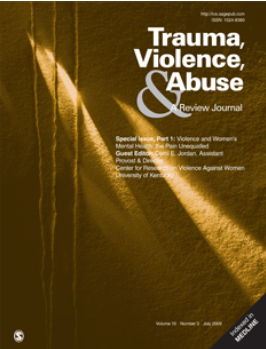经历亲密伴侣暴力和虐待的性和性别少数群体的心理健康支持:北美文献的系统回顾。
IF 5.4
1区 社会学
Q1 CRIMINOLOGY & PENOLOGY
引用次数: 0
摘要
性少数群体和性别少数群体由于压迫性的社会力量(如恐同、恐变性)而经历不公平的健康结果。对于遭受亲密伴侣暴力和虐待(IPV)的SGM来说,寻求帮助受到虐待伴侣的伴随导航和对SGM的歧视力量的挑战。精神卫生服务提供者是一个重要的支持来源,他们可以为经历IPV的SGM提供管理或离开虐待关系所需的工具和资源。本系统综述综合了北美地区经历IPV并获得心理健康支持的SGM寻求帮助经验的现有文献。该次要综述(#CRD42020139639)来自一项更大的研究,使用元聚合方法确定主要发现。作者检索了来自MEDLINE、Embase、PsycInfo、Scopus、CINAHL、Genderwatch和Social Science Abstracts的同行评审文献,并使用Joanna-Briggs Institute Checklists评估了有效性。从在美国(N = 29)和加拿大(N = 5)进行的研究(N = 34)中确定了四项综合发现:(a)肯定sgm空间的组成部分,(b)心理健康提供的特征,(c)治疗过程,以及(d)社区对服务的认识和熟悉程度。心理健康提供者(不包括夫妻咨询师)被认为是对经历IPV的SGM的积极支持形式,为自我发展和管理或离开虐待关系的技能提供了机会。肯定SGM的空间(例如,使用包容性语言)在IPV与精神卫生提供者的讨论中增加了SGM的舒适度。培训和确认sgm特定的IPV,以及客户-提供者的关系,进一步成为有效的精神卫生支持的基础。加强教育和外联将促进改善获得心理健康支助的机会。本文章由计算机程序翻译,如有差异,请以英文原文为准。
Mental Health Supports for Sexual and Gender Minorities Who Experience Intimate Partner Violence and Abuse: A Systematic Review of North American Literature.
Sexual and gender minorities (SGM) experience inequitable health outcomes due to oppressive social forces (e.g., homophobia, transphobia). For SGM experiencing intimate partner violence and abuse (IPV), help-seeking is challenged by concomitant navigation of the abusive partner and discriminatory forces toward SGM. Mental health providers are an important source of support who can provide SGM experiencing IPV with the tools and resources they need to manage or leave abusive relationships. This systematic review synthesized existing literature on the help-seeking experiences of SGM in North America who experienced IPV and accessed mental health supports. This secondary review (#CRD42020139639) from a larger study used meta-aggregative methods to identify main findings. The authors searched peer-reviewed literature from MEDLINE, Embase, PsycInfo, Scopus, CINAHL, Genderwatch, and Social Science Abstracts and assessed validity using the Joanna-Briggs Institute Checklists. Four synthesized findings were identified from studies (N = 34) conducted in the United States (n = 29) and Canada (n = 5): (a) components of SGM-affirming spaces, (b) characteristics of mental health provision, (c) healing journey process, and (d) community awareness and familiarity with services. Mental health providers (not including couples' counselors) were identified as positive forms of support for SGM experiencing IPV, providing opportunities for self-development and skills to manage or leave abusive relationships. SGM-affirming spaces (e.g., use of inclusive language) increased SGM comfort in IPV discussions with mental health providers. Training and acknowledgment of SGM-specific IPV, along with client-provider rapport, further underlie effective mental health supports. Increased education and outreach would promote improved access to mental health supports.
求助全文
通过发布文献求助,成功后即可免费获取论文全文。
去求助
来源期刊

Trauma Violence & Abuse
Multiple-
CiteScore
13.60
自引率
7.80%
发文量
131
期刊介绍:
Trauma, Violence, & Abuse is devoted to organizing, synthesizing, and expanding knowledge on all force of trauma, abuse, and violence. This peer-reviewed journal is practitioner oriented and will publish only reviews of research, conceptual or theoretical articles, and law review articles. Trauma, Violence, & Abuse is dedicated to professionals and advanced students in clinical training who work with any form of trauma, abuse, and violence. It is intended to compile knowledge that clearly affects practice, policy, and research.
 求助内容:
求助内容: 应助结果提醒方式:
应助结果提醒方式:


